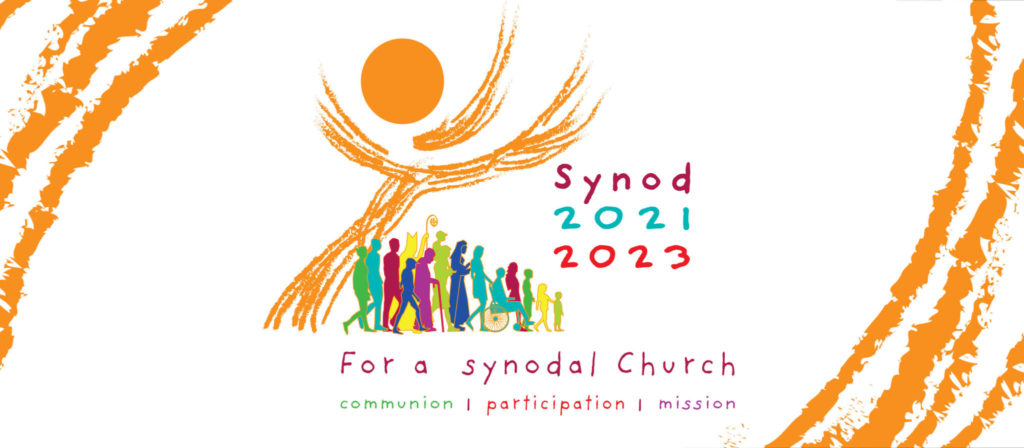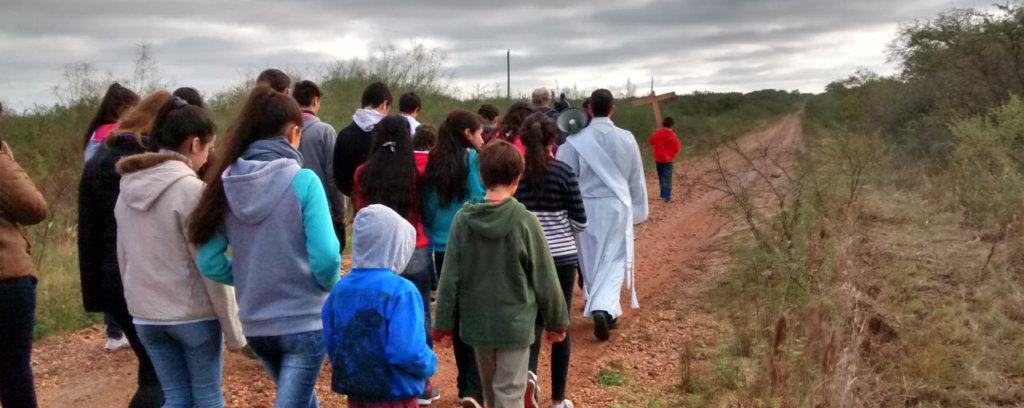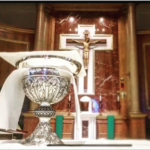
Pope Francis has instituted a universal synod inviting ALL Catholics across the globe to better discern together how to listen and communicate with each other to strengthen our communion in Christ Jesus. The three components of the Synod on Synodality as outlined by the Pope are “Communion, Participation and Mission.”
As an initial stage of the Synod process, the Pope, in union with the Bishops, sought the thoughts of ALL Catholics around the world (young, old, single, married, divorced, active, inactive . . . etc.), and also Catholics, non-Christians and non-believers to complete surveys and/or attend listening sessions. Here at St. Boniface, we played our part, largely by way of an online survey which garnered a strong response. Those responses were compiled with those from other parishes throughout our Diocese and forwarded to the Vatican, as were responses from around the world.
The Synod, a three-year process of listening and dialogue began in Rome in 2021. The first session of the Synod was held at the Vatican from October 4 – 29, 2023, and the second session is scheduled to be held in October 2024. The following letter was issued after the end of the 2023 assembly:

DOWNLOAD THE LETTER IN ENGLISH – FRENCH – JAPANESE – GERMAN – ITALIAN – SPANISH – PORTUGUESE – POLISH – SWAHILI – TAMIL – BELARUSIAN – CHINESE TRADITIONAL – CHINESE SEMPLIFIED – TETUM (Timor Leste) – MALAY – KOREAN
Dear sisters, dear brothers,
As the proceedings of the first session of the 16th Ordinary General Assembly of the Synod of Bishops draw to a close, we want to thank God with all of you for the beautiful and enriching experience we have lived. We lived this blessed time in profound communion with all of you. We were supported by your prayers, bearing with you your expectations, your questions, as well as your fears. As Pope Francis requested two years ago, a long process of listening and discernment was initiated, open to all the People of God, no one being excluded, to “journey together” under the guidance of the Holy Spirit, missionary disciples engaged in the following of Jesus Christ.
The session in which we have been gathered in Rome since 30 September is an important phase of this process. In many ways it has been an unprecedented experience. For the first time, at Pope Francis’ invitation, men and women have been invited, in virtue of their baptism, to sit at the same table to take part, not only in the discussions, but also in the voting process of this Assembly of the Synod of Bishops. Together, in the complementarity of our vocations, our charisms and our ministries, we have listened intensely to the Word of God and the experience of others. Using the conversation in the Spirit method, we have humbly shared the wealth and poverty of our communities from every continent, seeking to discern what the Holy Spirit wants to say to the Church today. We have thus also experienced the importance of fostering mutual exchanges between the Latin tradition and the traditions of Eastern Christianity. The participation of fraternal delegates from other Churches and Ecclesial Communities deeply enriched our discussions.
Our assembly took place in the context of a world in crisis, whose wounds and scandalous inequalities resonated painfully in our hearts, infusing our work with a particular gravity, especially since some of us come from countries where war rages. We prayed for the victims of deadly violence, without forgetting all those who have been forced by misery and corruption to take the dangerous road of migration. We assured our solidarity and commitment alongside the women and men all over the world who are working to build justice and peace.
At the invitation of the Holy Father, we made significant room for silence to foster mutual listening and a desire for communion in the Spirit among us. During the opening ecumenical vigil, we experienced how the thirst for unity increases in the silent contemplation of the crucified Christ. In fact, the cross is the only cathedra of the One who, having given himself for the salvation of the world, entrusted His disciples to His Father, so that “they may all be one” (John 17:21). Firmly united in the hope brought by His Resurrection, we entrusted to Him our common home where the cries of the earth and the poor are becoming increasingly urgent: “Laudate Deum!” (“Praise God!”), as Pope Francis reminded us at the beginning of our work.
Day by day, we felt the pressing call to pastoral and missionary conversion. For the Church’s vocation is to proclaim the Gospel not by focusing on itself, but by placing itself at the service of the infinite love with which God loved the world (cf. John 3:16). When homeless people near St. Peter’s Square were asked about their expectations regarding the Church on the occasion of this synod, they replied: “Love!”. This love must always remain the ardent heart of the Church, a Trinitarian and Eucharistic love, as the Pope recalled on October 15, midway through our assembly, invoking the message of Saint Thérèse of the Child Jesus. It is “trust” that gives us the audacity and inner freedom that we experienced, not hesitating to freely and humbly express our convergences, differences, desires and questions.
And now? We hope that the months leading to the second session in October 2024 will allow everyone to concretely participate in the dynamism of missionary communion indicated by the word “synod”. This is not about ideology, but about an experience rooted in the apostolic tradition. As the Pope reminded us at the beginning of this process, “communion and mission can risk remaining somewhat abstract, unless we cultivate an ecclesial praxis that expresses the concreteness of synodality (…) encouraging real involvement on the part of each and all” (October 9, 2021). There are multiple challenges and numerous questions: the synthesis report of the first session will specify the points of agreement we have reached, highlight the open questions, and indicate how our work will proceed.
To progress in its discernment, the Church absolutely needs to listen to everyone, starting with the poorest. This requires a path of conversion on its part, which is also a path of praise: “I thank you, Father, Lord of heaven and earth, that you have hidden these things from the wise and understanding and revealed them to little children” (Luke 10:21)! It means listening to those who have been denied the right to speak in society or who feel excluded, even by the Church; listening to people who are victims of racism in all its forms – in particular in some regions to indigenous peoples whose cultures have been scorned. Above all, the Church of our time has the duty to listen, in a spirit of conversion, to those who have been victims of abuse committed by members of the ecclesial body, and to commit herself concretely and structurally to ensuring that this does not happen again.
The Church also needs to listen to the laity, women and men, all called to holiness by virtue of their baptismal vocation: to the testimony of catechists, who in many situations are the first proclaimers of the Gospel; to the simplicity and vivacity of children, the enthusiasm of youth, to their questions, and their pleas; to the dreams, the wisdom and the memory of elderly people. The Church needs to listen to families, to their educational concerns, to the Christian witness they offer in today’s world. She needs to welcome the voice of those who want to be involved in lay ministries and to participate in discernment and decision-making structures.
To progress further in synodal discernment, the Church particularly needs to gather even more the words and experience of the ordained ministers: priests, the primary collaborators of the bishops, whose sacramental ministry is indispensable for the life of the whole body; deacons, who, through their ministry, signify the care of the entire Church for the most vulnerable. She also needs to let herself be questioned by the prophetic voice of consecrated life, the watchful sentinel of the Spirit’s call. She also needs to be attentive to all those who do not share her faith but are seeking the truth, and in whom the Spirit, who “offers everyone the possibility of being associated with this paschal mystery” (Gaudium et Spes 22, 5), is also present and operative.
“The world in which we live, and which we are called to love and serve, even with its contradictions, demands that the Church strengthen cooperation in all areas of her mission. It is precisely this path of synodality which God expects of the Church of the third millennium” (Pope Francis, October 17, 2015). We do not need to be afraid to respond to this call. Mary, the first on the journey, accompanies our pilgrimage. In joy and in sorrow, she shows us her Son and invites us to trust. And He, Jesus, is our only hope!
Vatican City, October 25, 2023
Who is the Synod for?

About the Synod
The Synod on Synodality is a two-year process of listening and dialogue that began with a solemn opening in Rome in October 2021. The synodal process will conclude in October 2023 with a gathering of the Synod of Bishops in Rome to explore the theme of synodality – journeying together– in the life of the Church.
The 16th Ordinary General Assembly of the Synod of Bishops will be held in two moments, that is, in two sessions, spaced one year apart: the first from October 4 to 29, 2023, the second in October 2024. Pope Francis referred to the Apostolic Constitution Episcopalis Communio, which contemplates this possibility (cf. Article 3).
This decision stems from the desire that the theme of a Synodal Church, because of its breadth and importance, might be the subject of prolonged discernment not only by the members of the Synodal Assembly, but by the whole Church.
Moreover, this choice is in continuity with the ongoing synodal journey, to which the Pope himself referred this morning. The Synod is not an event but a process in which the whole People of God is called to walk together toward what the Holy Spirit helps it to discern as being the Lord’s will for his Church.
Therefore, the Ordinary General Assembly of the Synod of Bishops will also take on a processual dimension, configuring itself as “a journey within the journey” to foster more mature reflection for the greater good of the Church.
From the very beginning, the General Secretariat of the Synod has chosen the path of listening and discernment, even in the planning and implementation phase of the synodal process. In the coming weeks, we will continue our discernment to better define the celebration of the two sessions of (and the time in-between) the XVI Ordinary General Assembly of the Synod of Bishops. We will communicate about this in due time.
This listening process began in 2021 by the local Churches, that is, by the People of God gathered around their Pastors; it has challenged the Bishops’ Conferences and Synods of the Eastern Catholic Churches. As many as 112 out of 114 Episcopal Conferences all the Eastern Catholic Churches carried out a discernment regarding what emerged in the particular Churches. Now, it continues with a Continental Stage that will culminate with the celebration of Continental Synodal Assemblies, between January and March 2023. These Continental Synodal Assemblies will be convened to reread the journey made and to continue the listening and discernment, having as their point of departure the Document for the Continental Stage, and proceeding in accord with the socio-cultural specificities of their respective regions. Their aim will be to carry out one more step in this spiritual journey.








